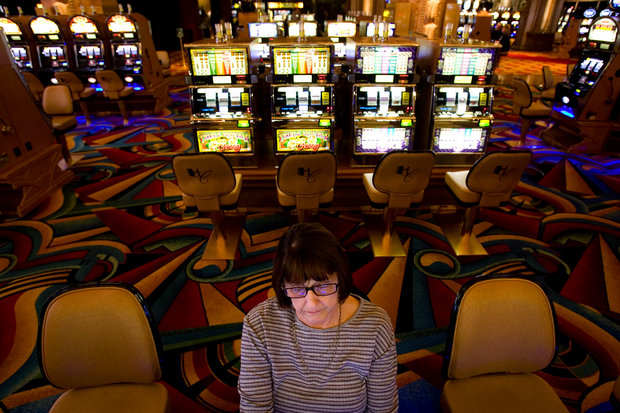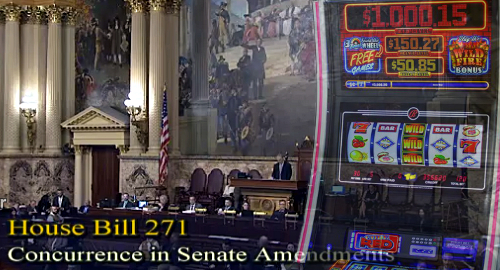Pa Gambling Expansion Bill
Corman had characterized the bill to Spotlight as a way to control and license the proliferation of illegal gambling machines in PA. He claimed expanding VGTs’ presence was somehow a matter of fairness, given the bill’s aim to widely allow skill games. He also said the move would raise revenues but never named an amount. Governor Tom Wolf has said he wants “real revenue” ideas, not something that “takes from one bucket called gambling to another.” The Pennsylvania General Assembly apparently isn’t heeding his.

Contents
With the stroke of a pen, online poker and gambling will become legal in Pennsylvania. The bill lies on a desk awaiting the signature of Gov. Tom Wolf, who has ten days to sign it.
On Wednesday, Oct. 25, after several years of tweaking and amending, the Pennsylvania Senate approved H 271 which legalizes online poker and online gambling in PA. Today, the House approved that bill by a vote of 109-72. All that remains for the bill to become law is for the governor to lend it his autograph.
Pennsylvania would become the fourth state to legalize online poker and gambling, following New Jersey, Delaware and Nevada. Estimates for additional government revenue brought in by this bill are around $250 million.
What the PA gaming expansion bill does
The bill would legalize online slot machines, online table games and online poker throughout Pennsylvania. It also regulates daily fantasy sports, sports betting (if federally legalized), online lottery, video gaming terminals at truck stops, and tablet gaming in airports.
It also authorizes up to ten satellite casinos, which are smaller template gambling centers set up in lower population zones. Additionally, the bill changes Category 3 licenses to remove the membership fee for a higher one-time fee. The government outlines its fiscal estimates on the bill here.
Online gambling licensing in Pennsylvania
After the bill is signed into law, the state’s existing 12 casinos would have 90 days to apply for a discounted license to operate all three forms online gambling (poker, slots, and table games). The discounted price is $10 million, which after 90 days increases to $4 million per license.
Only after the existing PA casinos decide whether or not to apply for a license can out-of-state entities apply to be an online gambling operator.
Will it get signed?
Wolf has historically maintained a cautiously open-minded approach toward online gaming legislation. But confidence is high that he will sign it.
His main hesitation has been that online gaming should not steal revenue away from Pennsylvania’s current legal casinos and gaming outlets. The bill’s tax rate would be 16 percent for poker and table games. Online slot machines would be set at 54 percent to match the current rate set for land-based slots in the commonwealth.
About those tax rates…
It appears legislators have come to an agreement that these are suitable tax rates that they believe will not impact local gaming businesses, but others disagree. Eric Schippers of Penn National, which operates the Hollywood Casino, has been quoted saying it is considering suing to stop the bill.
“We’re considering our legal options because this would have a uniquely punitive effect on our casino, more so than any other casino in the state,” Schippers said.
Penn National’s issue with the bill centers around the fact that the company believes satellite casinos will impact its business more than other casinos throughout Pennsylvania. In an earnings call Thursday morning, Schippers saw “significant flaws” in the bill, noting the 54 percent tax rate for slots.
“We’re going to have to weigh all our options, and we’re going to have to dissect the 970 pages and go from there,” Schippers said.
Pa Gambling Expansion Bill 2020
Other critics of the tax rate have come forward to say that if $10 million is the price tag, no one will pay it. With razor thin margins in New Jersey for online gaming, there are few if any who would risk $10 million for such a slow and uncertain return on investment.
With questionable trends in Pennsylvania’s slot machine performance, a high tax rate may not be the appropriate solution to declining revenues.
The journey begins for legal online gambling in Pennsylvania
Time money will tell if the current tax rate will make sense for Pennsylvania. One thing is certain. If Wolf signs the bill, it will only be the end of the beginning of online gaming’s legislative struggle.

New legislation is working its way through the Pennsylvania General Assembly that would once again expand gambling vices throughout the Commonwealth – and it’s far time that families say enough is enough.
Senate Bill 1256 would allow for over 80,000 slot machines (called video gaming terminals or VGTs) in thousands of local communities across Pennsylvania. Here are three reasons why this latest proposal is very troubling:
Pa Gambling Expansion Bill Vote
1) SB1256 would spread a form of gambling that elevates the risk of addiction.
These video slot machines are the worst form of gambling when it comes to addiction rates. They have been called “electronic morphine” and the “crack cocaine” of gambling due to their visual appeal and fast pace of play.
SB1256 not only would be spreading one of the most highly addictive forms of gambling across our state, but place them in thousands of local communities well outside of brick-and-mortar casinos. States like Illinois have shown that low income neighborhoods are often targeted.
2) We already have too much state-sponsored gambling.

Pennsylvania has already expanded more forms of gambling than almost every other state. In 2004, then-Governor Ed Rendell declared “the people of Pennsylvanians are true winners” with the legalization of what became twelve brick-and-mortar casinos offering tens of thousands of slot machines. (To note: Rendell said at the time, ”We are beginning to reverse the tide of unfairly burdening Pennsylvania homeowners.” How many have received any significant property tax relief?)
These machines “are usually played at a much faster rate than other games, so players can lose money much more quickly,” says the Center for Addiction and Mental Health.
Today, in large part due to Pennsylvania’s most recent gambling expansion in 2017, speed of play is a priority with a slew of new gambling forms:
- Keno: “Fast-paced game.” Drawings held every four minutes.
- iLottery: “Play 24 hours a day, 7 days a week.” Drawings held every few minutes.
- Fast Play: Online scratch-off games allow you to gamble “without scratching the ticket or waiting for a drawing.”
- Online casinos: Live dealers 24/7. Place bets anytime, anywhere in Pennsylvania.
- Sports betting: Live betting on every sport anytime, anywhere.
- Video gaming terminals in truck stops: the “crack-cocaine” of gambling, now turning dozens of truck stops into mini-casinos.
The Council of Compulsive Gambling in Pennsylvania identifies one risk factor for gambling addiction as the fast speed of play. Yet that’s exactly what SB1256 is trying to further expand across the Commonwealth.
3. SB1256 would multiply non-casino slot machines by over 400x.
Currently, there are less than 200 slot machines (VGTs) in various truck stops throughout Pennsylvania; legalized through the 2017 massive gambling expansion. SB1256 would allow for the expansion of those slot machines to reach over 80,000 – over 400 times the current amount.
Pennsylvania families need real revenue solutions. Gambling is not the answer. More gambling options that emphasize a fast speed of play is a bad recipe for families in Pennsylvania.
As the Philadelphia Inquirer puts it, each gambling expansion “is focused on maximizing revenues with little regard for the negative impact on local communities.”

Take Action: Please Pennsylvania, No More Gambling!
Contact your state elected officials and tell them please, no more gambling! To email, click here or go to pafamily.org/nomore